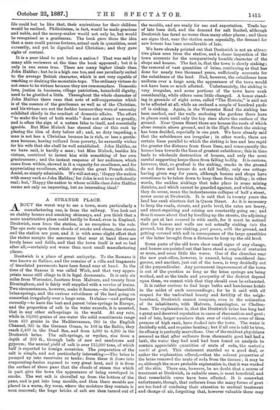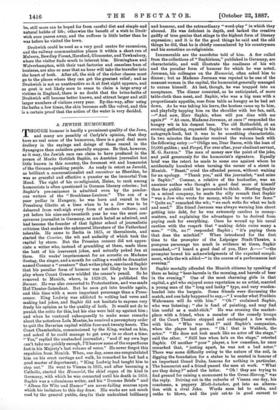A STRANGE PLACE.
ABOUT the worst way to see a town, more particularly a manufacturing one, is from the railway. You look out on shabby houses and smoking chimneys, and you think that a more unattractive place could hardly be found, even in England. Droitwich, seen from the station, is no exception to the rule. The eye rests upon dense clouds of smoke and steam, the streets and the station are poor, and it is with some slight effort that the visitor accepts the assurance that near at hand there are lovely lanes and fields, and that the town itself is not so bad after all,—certainly not worse than most small manufacturing places.
Droitwich is a place of great antiquity. To the Romans it was known as Salinm, and the remains of a villa and fragments of tesselated pavements have been found near at hand. In the time of the Saxons it was called Wich, and that very appro- priate name still clings to it in legal documents. It is only six miles from Worcester, fourteen from Malvern, and twenty from Birmingham, and is fairly well supplied with a service of trains. Two circumstances, however, make it famous,—its inexhaustible brine-springs, and the curious subsidence of the land going on somewhat irregularly over a large area. It claims—and perhaps correctly—to have the best and purest brine-springs in Europe, and the proportion of salt in the water exceeds, it is asserted, that in any other salt-springs in the world. At any rate, while in 10,000 grains of sea-water the solid constituents range from 410 grains in the Mediterranean, 380 in the English Channel, 325 in the German Ocean, to 168 in the Baltic, they reach 2,460 in the Dead Sea, and from 4,000 to 4,200 in the Droitwich brine. The salt-springs, or wyches, rise from a depth of 200 ft., through beds of new red sandstone and gypsum; the annual yield of salt is over 115,000 tons, of which half is exported to foreign countries. The preparation of the salt is simple, and not particularly interesting:—The brine is pumped up into reservoirs or tanks ; from these it flows into evaporating-basins exposed to very great heat, and it is from the surface of these pans that the clouds of steam rise which in part give the town the appearance of being enveloped in smoke. The wet salt is shovelled up from the bottom of the pans, and is put into long moulds, and then these moulds are placed in a warm, dry room, where the moisture they contain is soon removed ; the huge bricks of salt are then turned out of the moulds, and are ready for use and exportation. Trade has of late been dull, and the demand for salt limited, although Droitwich has fared no worse than many other places ; and there are signs that, near the station more especially, the demand for new houses has been considerable of late.
We have already pointed out that Droitwich is not an attrac- tive place seen from the station, and a closer inspection of the town accounts for the comparatively humble character of the shops and houses. The fact is, that the town is slowly sinking ; the removal of vast quantities of brine, continuing as that has done for nearly two thousand years, sufficiently accounts for the subsidence of the land. Had, however, the subsidence been uniform over a large area, the appearance of the town would not have been so much affected. Unfortunately, the sinking is very irregular, and some portions of the town have sunk considerably, while others seem little changed. A house stand- ing in grounds of eight acres, called "The Heriots," is said not to be affected at all, while an orchard a couple of hundred yards off is sinking. Again, in the Worcester Road the sinking has been marked, and the walls enclosing the gardens there have in places sunk until only the top rises above the surface of the ground. Near Queen Street there are houses the roofs of which alone remain above ground, and in the High Street the sinking has been decided, especially in one part. We have already said that the subsidences are irregular ; in other words, there are certain lines parallel to which the sinking is less and less rapid the greater the distance from those lines, and consequently the houses lean towards the lines of greatest subsidence ; this in time leads to wholesale destruction of houses, and only the most careful supporting keeps them from falling bodily. It is curious, however, that, so gradual is the sinking, cracks in the ground do not form and houses do not fall bodily, only one cottage having given way for years, although houses and shops have sometimes to be taken down to keep them from falling ; in other words, the sudden sinkings that take place in some mining districts, and which cannot be guarded against, and which, when they do occur, mean the instantaneous collapse of half a street, never occur at Droitwich. It is said that in twenty years the land has sunk nineteen feet in Queen Street. As it is necessary to keep the roads, streets, and yards level, the rates are heavy, and street.repairing and raising are constantly going on;' and thus it comes about that by levelling up the streets, the adjoining walls get at last covered in with earth, for it must be noticed that the houses and walls are not actually sinking into the ground, but they are sinking, pari passu, wills the ground, and getting covered with soil in consequence of the large quantities of the latter brought from a distance to keep up the old level.
Some parts of the old town show small signs of any change, and houses are pointed out that have stood a couple of centuries or more, and seem little the worse. One of the churches near the new post-office, however, is unused, being considered dan- gerous, and another, just out of the town, is very decidedly out of the perpendicular. Any permanent improvement of the town is out of the question as long as the brine springs are being worked, and as the trade and prosperity of the district depend upon them, we cannot wish that they should soon be exhausted.
It is rather curious to find large baths and handsome hotels in the midst of such surroundings ; for be it said with all respect for the undoubted beauty and fertility of the neigh- bourhood, Droitwich cannot compare, even in the estimation of its inhabitants, with Malvern, Leamington, or Chelten- ham. The explanation is, that the Droitwich brine has long had a great and deserved reputation in cases of rheumatism and gout ; and of late, larger numbers than ever of visitors, some of them persons of high rank, have flocked into the town. The water is decidedly cold, and requires heating; but if all one is told be true, its efficacy is perfectly marvellous. One of the resident physicians assured us that after sufferers from rheumatic goat had had a bath, the water they bad used had been found on analysis to contain appreciable quantities of orate of soda, the material, morbi of gout. This statement startled us a good deal, or rather the explanation offered,—that the solvent properties of the brine removed the orate of soda from the tissues ; it may be so, although the more probable explanation is, that it was washed off the akin. There can, however, be no doubt that a course of treatment at Droitwich, in suitable cases, is most beneficial, and that remarkable cares have been effected. It is somewhat unfortunate, though, that sufferers from the many forms of gout • are too fond of confining their attention to medical treatment and change of air, forgetting that, however valuable these may be, still more can be hoped for from careful diet and simple and natural habits of life; otherwise the benefit of a visit to Droit- wish soon passes away, and the sufferer is little better than he was before he visited the town.
Droitwich could be used as a very good centre for excursions, and the railway communication places it within a short run of Malvern, Bewclley Foreet,Hereford, Gloucester, and Tewkesbury, where the visitor finds much to interest him. Birmingham and Wolverhampton, with their vast factories and ceaseless hum of business, are also so near that an hoar will take the traveller into the heart of both. After all, the sick of the richer classes must go to the places where they can get the greatest relief; and as Droitwich is not so unattractive as it at first sight appears, and as gout is not likely soon to cease to claim a large army of victims in England, there is no doubt that the brine-bathe of Droitwich will become better known, and attract larger and still larger numbers of visitors every year. By-the-way, after using the baths a few times, the skin becomes soft like velvet, and this is a certain proof that the action of the water is very decided.







































 Previous page
Previous page